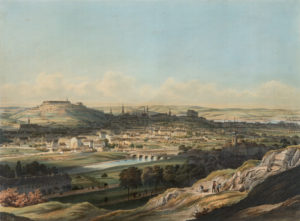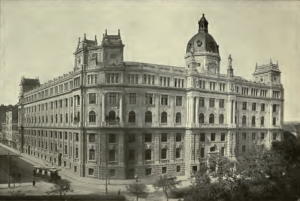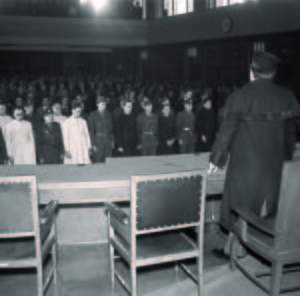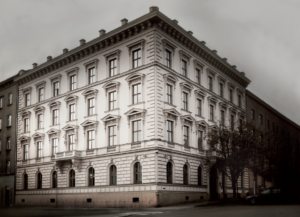
The origins of present-day institute of public prosecution date back to 1437 when Emperor Sigismund established the Office of Royal Prosecutor and appointed Vilém of Žlutice the head of the office with the authority to represent the king in legal proceedings. The competence of the royal prosecutor, who originally worked only at the provincial court – while a similar role was performed by royal village magistrates at municipal courts – was extended to collect property claims of the king, and to represent property interests of the crown at courts. Royal prosecutors started to engage in prosecuting crimes which private prosecutors failed to prosecute, sit at some courts, and act as defenders of public interest.
At the end of the 16th century, due to the considerable increase of the agenda, the royal prosecutor had to hire assistants. This process resulted in the establishment of an office described as a prosecutor’s chamber or a fiscal office headed by the prosecutor as the genuine representative of the monarch.
Although the re-established provincial system imposed the duty for the prosecutor to prosecute all criminal acts, this function started to loose on importance because the so-called inquisitorial procedure started to prevail in which the inquisition judge fulfilled the role of the prosecutor, judge and also the defender. Hence, the prosecutor did not have any place in the system. This kind of procedure prevailed in this country in the 18th century, although the accusatory procedure formally existed until the ultimate abolishment of torture was implemented in the Czech Lands enacted by the Joseph II general criminal law in 1788.
The 18th century saw the introduction of the term of the royal fiscal office instead of the prosecution office. Despite the change in terminology, the criminal agenda of fiscal offices has not disappeared until 1850 when these offices were abolished; these offices still had the duty to prosecute the would-be nobility, the manorial nobility who oppressed their subjects, profiteering, and contraband.
The year 1848 was a significant turning point in the development of public prosecution. In the middle of 1848 first provisional public prosecution offices were established to prosecute press cases judged by juries. The legal foundation for building the institute of public prosecutors in the Austrian and Czech Lands was laid in § 103 of the 1849 Stadion (March) Constitution, which implemented the accusatory principle in criminal proceedings by which the inquisitorial proceedings were definitely abolished.
The existence of public prosecution was also regulated in the new judicial proceedings from which it was transferred to imperial decisions introducing a new judicial organization in individual lands of the crown. This organization was regulated by decree 290/1849 for the Czech Lands and by decree 291/1849 for Moravia and Silesia. The public prosecution organization was regulated by the so-called “organic law on public prosecution” which specified the competence of this body. This law also used the Czech term of „státní návladní“ as well as the German term of „Staatsanwaltschaft“ for the first time. Both terms had been used until the beginning of the first Czechoslovak Republic

The Stadion Constitution specified the area of criminal proceedings as the main focus of the activity of public prosecution. The Organic law, § 69, referred to the temporary Penal Code of 17 January, 1850 under which public prosecutors should act at all regional and all provincial courts, including the necessary number of the so-called “substitutes”, office clerks and servants. The high provincial courts in capital cities of individual lands – in Prague for the Czech Lands, in Brno for Moravia and Silesia and at the cassation court in Vienna – should have high public prosecutors with the necessary number of deputies (advocates-general). Since April 1850, Brno was the seat of general prosecution and simultaneously public prosecution offices started to be established at individual provincial and regional courts. Hence it can be noted that the location of the supreme body of the prosecution system in Brno has more than 150 year-long tradition.
Under the temporary Penal Code No. 25/1850 the basic task of public prosecution was to prosecute ex officio all criminal acts of which the prosecutor learns, with the exception of those acts which could be prosecuted exclusively upon request of the affected. It was a very modern principle which has been kept to this day.
Public prosecution was primarily entitled to defend the interest of the state to observe the law during legal proceedings, file public criminal complaint, and represent the state in criminal proceedings. Last but not least it should make sure that innocent people were prosecuted. Public prosecutors made sure the legality of prosecution was observed. Their duties included participation in preparatory inquiries and all major sessions at district and provincial courts, unless the prosecutor general did not reserve the case for himself. The public prosecution performed important functions also in some types of civilian sessions.
After independent Czechoslovakia was declared in 1918, Law No. 11/1918 was passed which was a smooth continuation of the Austrian and Hungarian administration. The public prosecution system abolished the title of “státní návladní” and “vrchní státní návladní” and renamed chief public prosecutors as prosecutors. The organization of public prosecution was similar to that of today. The system consisted of three levels:
- General Prosecution
- High (Provincial) Prosecution
- Prosecution at regional courts

Under the Act No. 5/1918 which introduced the Supreme Court which had the competence all over the newly established Czechoslovak Republic, the Prosecutor General and his deputies were appointed. The deputies were first called general advocates and then deputy prosecutors general or prosecutors. The seat of the Prosecutor General was Brno since 1919. However, the Prosecutor General was not part of the general system of prosecution. He was rather a kind of a body endowed with competencies sui generis, who could file void complaints against decisions of any criminal court. He was inferior in authority to the ministry of justice however; public prosecution offices at courts of the first and second levels were not accountable to him. High prosecutions headed by a high prosecutor operated in criminal proceedings at high courts in individual lands. The high prosecutor was especially responsible for supervising the activity of prosecutions in his district.
Prosecution offices at regional courts included a chief prosecutor and rank and file prosecutors. The chief prosecutor and the other prosecutors participated in the initial prosecution of criminal acts at regional courts, investigated into legal remedies against the decision of district courts in criminal cases, and supervised over the execution of sentence, filed complaints in criminal cases with regional courts and the grand jury, and led for the prosecution at the main court hearings.
Contrary to the present legal regulation, there were no district prosecution offices. There were only prosecution officers with little or no legal education who participated in criminal cases at district courts and filed legal remedies against their decision. These officers were subordinate to prosecution offices at regional courts and fulfilled their orders.
In general terms it should be noted that many principles on which the first republican public prosecution was founded is topical to this day. When a new model of public prosecution was created after 1989, this period served as an evident inspiration.
The year 1948 brought significant social changes. Under the Law No. 319/1948 on the democratization of justice, the entire system composed of the Prosecution General’s Office, regional and district prosecution offices remained subordinate to the minister of justice while the Prosecutor General’s Office was not even a proper prosecution authority.
A significant Law No.232/1948 on the state court introduced the State Prosecution’s Office at this court which was managed by the state prosecutor who was totally independent of the organization structure of public prosecution, and who answered directly to the minister of justice who prosecuted only criminal acts on the basis of the law on the protection of the republic.
Another change was brought about by the law on judges (No. 67/1950) under which the president appoints the prosecutor general, the government appoints the state prosecutor, and the minister of justice appoints regional and district prosecutors. The minister of justice was also authorized to dismiss all those prosecutors.
This arrangement was in force only until 1952, when the Constitutional Law No. 64/1952 on judges and prosecution and the implementing provision No. 65/1952 on prosecution, established prosecution as an independent centralized monocratic authority of supreme supervision headed by the Prosecutor General who was appointed by the president but was responsible to the government. The Prosecutor General’s Office included deputy prosecutors general, regional and district prosecutors and their deputies, higher and lower field prosecutors and their deputies, other prosecutors, and military prosecutors. Many competences of the prosecutor were expanded such as material competence, the possibility of the prosecutor to review the legitimacy of generally binding regulations of national committees and generally binding legal regulations of ministries, and consequently of supervision of the prosecutor over places of the execution of custody, imprisonment, protective therapy and preventive education.
Another change occurred in 1960 when a new Constitution came into effect, when the Prosecution General’s Office was subordinated to the legislative power – the National Assembly.
The last changes, so to speak, occurred after the federalization of the republic in 1968 which introduced a structure which has been in effect more or less unchanged until the adoption of the current law on public prosecution. The structure was as follows:
The umbrella organization continued to be the Prosecution General’s Office of the Czechoslovak Socialist Republic. The other parts of the structure were the following authorities:
- Prosecutor General’s Office of the Czechoslovak Republic (the umbrella organization),
- Chief Military Prosecution,
- Prosecution General’s Office of the Czech Socialist Republic,
- Prosecution General’s Office of the Slovak Socialist Republic,
- Regional prosecution offices,
- Municipal prosecution offices in Prague with the competences of regional prosecution,
- District and municipal prosecution offices with the competences of district prosecution,
- Higher military prosecution offices (in the position of regional prosecution),
- Military district prosecution offices (in the position of district prosecution),
- and at the time of defense alert duty also higher and lower field prosecution offices.

Every prosecution office included a chief prosecutor, rank and file prosecutors and investigators. The range of competences was widespread; the prosecution controlled not only the entire executive power but also the judiciary. Although it was defined de iure as a completely independent authority it was in close contact with the ruling communist party whose leading role it had to respect. This interconnection and related active cooperation in the crimes of communism is the darkest part in modern history of our public prosecution. As concrete sad examples we should mention at least the participation of prosecutors in political trials against representatives of the political opposition, or concrete participation of some prosecutors in proceedings related to the confiscation of land and property of farmers and their expulsion.
This was the major reason why prosecution was rejected after the Velvet Revolution and why public prosecution was introduced as a completely different model of public action. It was based on the autonomy of individual levels of the system, on the refusal of a general supervision over the rule of law on the part of public prosecution, as well as the institutional subordination of public prosecution to the executive power and thus a significant factual weakening of its position.
In connection with the overthrow of the totalitarian communist regime the prosecution underwent a factual cleansing of its ties with the ruling structures, and significant personal changes occurred. First, it was necessary to get rid of persons who had been directly involved in the wrongdoings of the former regime, and then it was necessary to make sure that those persons could not bid for the position of a judge again. The basic legal instrument was Law No. 451/1991, the so-called screening law, under which prosecutors, judges and other positions who did not fulfill certain screening conditions could be dismissed from their positions, and then all candidates born before December 1, 1971 must submit a negative screening certificate before they are appointed. Consequently, a minor amendment to Law No. 60/1965 on prosecution – Law No. 168/1990 was passed under which the supervision of prosecution over the decision of courts was limited but the provision on the general supervision was left unchanged.
The fundamental change of the position and tasks of the prosecution, later renamed as public prosecution, occurred in 1993 in connection with the division of Czechoslovakia. The Constitution of the Czech Republic of 1993 stipulates the position of the public prosecutor in article 80 as follows: „The Public Prosecutor’s Office represents public prosecution in criminal proceedings; it performs other tasks as regulated by an Act of Parliament.”
Public prosecution is thus regulated in the chapter devoted to the executive power which augurs its personal, organizational, and material subordination to the executive power, concretely to the Ministry of Justice. All details pertaining to public prosecution were contained in Law No. 283/1993 on public prosecution which came into effect on January 1, 1994.

This law was also subject to many amendments in the course of time. The amendment No. 14/2002 is of particular interest because it expanded and specified the institute of external and internal supervision in the system and introduced various specific competences of the Prosecutor General contributing to the unification of decisions of individual public prosecution offices. It also stipulated that public prosecution acts to protect public interest in that public prosecutor does not only prosecute persons suspected of committing a crime but alsothat the public prosecutor also protects the fundamental rights and liberties which can be violated during criminal proceedings.
Another significant turning point was coming into force the new Law on the Administrative Court No. 150/2002 under which the competence of the Prosecutor General was extended to cover a completely new area. Under § 66 of this law the Prosecutor General is authorized to file a suit against the decision of administrative bodies if he comes to the conclusion that it is in public interest. The law does not offer any concrete definition in this respect so the assessment will always be made on a case by case basis.
